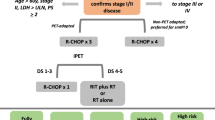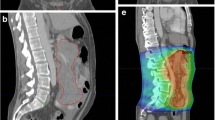Opinion Statement
The seminal SWOG trial S8736 trial established the success of a short course of chemotherapy followed by involved field radiation in treating limited stage aggressive NHL lymphoma. Addition of rituximab offered a surprisingly modest improvement in this disease subset. Radioimmunotherapy could hold a slight advantage over rituximab, but that should be investigated in a randomized trial setting. The role of radiation therapy continues to be widely debated, with interpretation complicated by different trial populations, methods of assessing risk, as well as by differences in timing and dose of radiation. Prolonged course of chemotherapy followed by radiation is certainly not justified in all patients with limited stage disease. Three to four cycles of R-CHOP followed closely by IFRT/ISRT, or six cycles of R-CHOP chemoimmunotherapy (based on the MInT trial) are acceptable options. PET/CT scans may further limit radiation to minority of patients who have residual PET-positive masses. PET/CT-directed treatment strategy is being tested in a US intergroup trial. There is evidence that localized DLBCL has a different biology as compared to advanced stage disease. This relates to propensity of limited stage disease to be proportionately more germinal center B-cell like (GCB) and to have late relapses beyond 5 years. Both biology and imaging need to be integrated in the study of limited stage disease without presumption that it should be approached the same as advanced stage disease.
Similar content being viewed by others
References and Recommended Reading
Papers of particular interest, published recently, have been highlighted as: • Of importance •• Of major importance
Morton LM, Wang SS, Devesa SS, et al. Lymphoma incidence patterns by WHO subtype in the United States, 1992-2001. Blood. 2006;107:265–76.
Miller TP, Dahlberg S, Cassady JR, et al. Chemotherapy alone compared with chemotherapy plus radiotherapy for localized intermediate- and high-grade non-Hodgkin’s lymphoma. N Engl J Med. 1998;339:21–6.
Miller TP, Leblanc M, Spier CM, et al. CHOP alone compared to CHOP plus radiotherapy for early aggressive non-Hodgkin’s lymphoma: update of the Southwest Oncology Group (SWOG) randomized trial. Blood. 2001;98:724a.
Stephens DM, Li H, Leblanc M, et al. Continued risk of relapse independent of treatment modality in limited stage diffuse large B-cell lymphoma: final and long-term analysis of SWOG Study S8736. J Clin Oncol. 2016. doi:10.1200/JCO.2015.65.4582. Final results of Landmark study SWOG 8736, with comparison to rituximab containing S0014, which show continued late relapses in both arms of the study, as well as illustrate similar rates of secondary malignancies.
Horning SJ, Weller E, Kim K, et al. Chemotherapy with or without radiotherapy in limited-stage diffuse aggressive non-Hodgkin’s lymphoma: Eastern Cooperative Oncology Group study 1484. J Clin Oncol. 2004;22:3032–8.
Ballonoff A, Rusthoven KE, Schwer A, McCammon R, Kavanagh B, Bassetti M, Newman F, Rabinovitch R: Outcomes and effect of radiotherapy in patients with stage I or II diffuse large B-cell lymphoma: a surveillance, epidemiology, and end results analysis. Int J Radiat Oncol Biol Phys. 2008:72:1465–1471.
Reyes F, Lepage E, Ganem G, et al. ACVBP versus CHOP plus radiotherapy for localized aggressive lymphoma. N Engl J Med. 2005;352:1197–205.
Bonnet C, Fillet G, Mounier N, et al. CHOP alone compared with CHOP plus radiotherapy for localized aggressive lymphoma in elderly patients: a study by the Groupe d’Etude des Lymphomes de l’Adulte. J Clin Oncol. 2007;25:787–92.
Persky DO, Unger JM, Spier CM, et al. Phase II study of rituximab plus three cycles of CHOP and involved-field radiotherapy for patients with limited-stage aggressive B-cell lymphoma: Southwest Oncology Group study 0014. J Clin Oncol. 2008;26:2258–63.
Persky DO, Miller TP. Localized large cell lymphoma: is there any need for radiation therapy? Curr Opin Oncol. 2009;21(5):401–6.
Pfreundschuh M, Trumper L, Osterborg A, et al. CHOP-like chemotherapy plus rituximab versus CHOP-like chemotherapy alone in young patients with good-prognosis diffuse large-B-cell lymphoma: a randomised controlled trial by the MabThera International Trial (MInT) Group. Lancet Oncol. 2006;7:379–91.
Recher C, Coiffier B, Haioun C, et al. Intensified chemotherapy with ACVBP plus rituximab versus standard CHOP plus rituximab for the treatment of diffuse large B-cell lymphoma (LNH03-2B): an open-label randomised phase 3 trial. Lancet. 2011;378:1858–67.
Pfreundschuh M, Kuhnt E, Trumper L, et al. CHOP-like chemotherapy with or without rituximab in young patients with good-prognosis diffuse large-B-cell lymphoma: 6-year results of an open-label randomised study of the MabThera International Trial (MInT) Group. Lancet Oncol. 2011;12:1013–22.
Lamy T, Damaj G, Gyan E, et al. R-CHOP with or without radiotherapy in non-bulky limited-stage diffuse large B cell lymphoma (DLBCL): preliminary results of the prospective randomized phase III 02-03 trial from the LYSA/GOELAMS. Blood. 2014;124: Abstract 393. First randomized phase III trial in rituximab era dedicated to limited stage DLBCL, which showed excellent outcomes in both RT and observation arms questioning the need for radiation.
Phan J, Mazloom A, Medeiros LJ, et al. Benefit of consolidative radiation therapy in patients with diffuse large B-cell lymphoma treated with R-CHOP chemotherapy. J Clin Oncol. 2010;28:4170–6.
Terada Y, Take H, Shibayama H, et al. Short cycle of immunochemotherapy followed by radiation therapy compared with prolonged cycles of immunochemotherapy for localized DLBCL: the Osaka Lymphoma Study Group (OLSG) retrospective analysis. Blood. 2012;120:Abstract 1628.
Vargo JA, Gill BS, Balasubramani GK, Beriwal S. Treatment selection and survival outcomes in early-stage diffuse large B-cell lymphoma: do we still need consolidative radiotherapy? J Clin Oncol. 2015;33(32):3710–7. Database study suggesting that the outcomes for radiation containing treatment are better, even though the use of radiation is declining
Kumar A, Lunning MA, Zhang Z, et al. Excellent outcomes and lack of prognostic impact of cell of origin for localized diffuse large B-cell lymphoma in the rituximab era. Br J Haematol. 2015;171(5):776–83. Single center study showing excellent outcomes in limited stage DLBCL regardless of treatment strategy and cell of origin designation as based on immunohistochemistry, with majority of patients being of germinal center B-cell origin
Persky DO, Miller TP, Unger JM, et al. Ibritumomab consolidation after 3 cycles of CHOP plus radiotherapy in high-risk limited-stage aggressive B-cell lymphoma: SWOG S0313. Blood. 2015;125:236–41. Long-term results of using radioimmunotherapy instead of “naked” anti-CD20 antibody showing similar, if not slightly better PFS at 7 years
Witzig TE, Hong F, Micallef IN, et al. A phase II trial of RCHOP followed by radioimmunotherapy for early stage (stages I/II) diffuse large B-cell non-Hodgkin lymphoma: ECOG3402. Br J Haematol. 2015;170:679–86. Phase II study showing excellent outcomes with RCHOP followed by radioimmunotherapy, almost completely omitting radiation
Sehn LH, Savage KJ, Hoskins P, et al. Treatment of limited stage DLBCL can be effectively tailored using a PET-based approach. Ann Oncol. 2011;22:Abstract 028.
Larouche JF, Berger F, Chassagne-Clement C, et al. Lymphoma recurrence 5 years or later following diffuse large B-cell lymphoma: clinical characteristics and outcome. J Clin Oncol. 2010;28:2094–100.
Roberts RA, Rimsza LM, Staudt L, et al. Gene expression differences between low and high stage diffuse large B cell lymphoma (DLBCL). Blood. 2006;108(11):Abstract 809.
Author information
Authors and Affiliations
Corresponding author
Ethics declarations
Conflict of Interest
The authors declare that they have no conflict of interest.
Daniel O. Persky has received research funding through a grant from Spectrum Pharmaceuticals, Inc.
Human and Animal Rights and Informed Consent
This article does not contain any studies with human or animal subjects performed by any of the authors.
Additional information
This article is part of the Topical Collection on Lymphoma
Rights and permissions
About this article
Cite this article
Kumar, A., Sundararajan, S., Puvvada, S. et al. Limited Stage Aggressive Non-Hodgkin Lymphoma: What Is Optimal Therapy?. Curr. Treat. Options in Oncol. 17, 45 (2016). https://doi.org/10.1007/s11864-016-0424-2
Published:
DOI: https://doi.org/10.1007/s11864-016-0424-2




